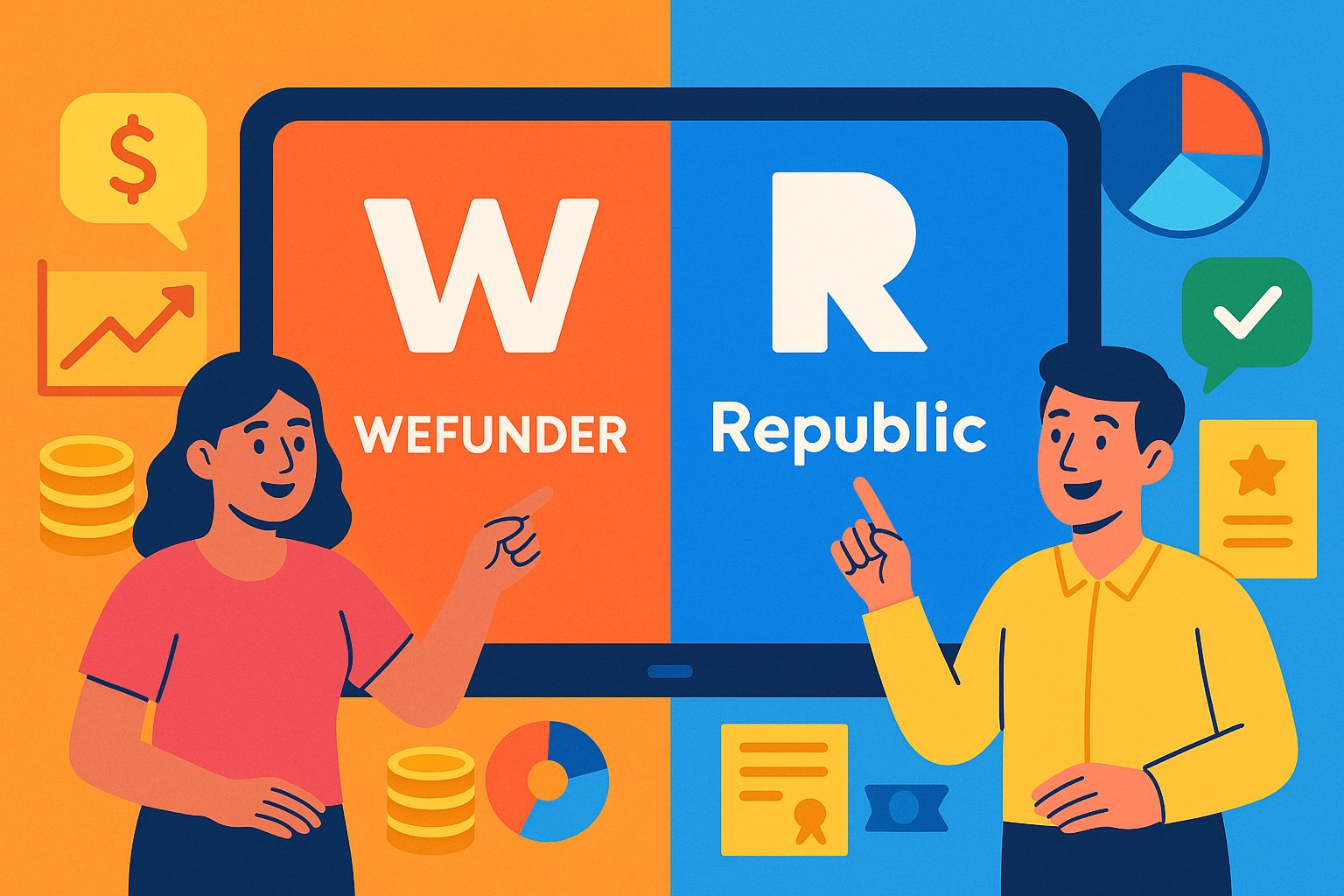Community-driven crowdfunding has transformed the way startups and small businesses secure capital. No longer confined to bank loans or venture capital firms, founders can tap into the enthusiasm and financial backing of their own networks. Among the platforms leading this charge are Wefunder and Republic, two pioneers in equity crowdfunding under Regulation Crowdfunding (Reg CF). While both platforms share the mission of democratizing investment, each has carved out its own niche through differentiated features, fee structures, and community engagement tools. In this comparison, we’ll examine how Wefunder and Republic stack up for founders seeking to leverage community momentum, and weigh which may be best suited to your campaign’s unique needs.
Origins and Ethos: Wefunder’s Community Spirit vs. Republic’s Curated Approach
Launched in 2012, Wefunder is often hailed as the OG of Reg CF crowdfunding portals, having facilitated campaigns from neighborhood brewpubs to cutting-edge tech startups. Its ethos centers on inclusivity: campaigns welcome investments as low as $100 to encourage broad participation. Wefunder’s platform emphasizes storytelling and community-building, providing founders with narrative tools to engage supporters beyond mere capital contributions.
In contrast, Republic—founded in 2016—positions itself as a sleek, curated marketplace for startups, real estate, and even crypto projects. With a minimum investment threshold of $50, Republic draws both accredited and non-accredited investors through a multi-asset platform that includes equity, revenue-sharing, and token-based offerings. Republic’s vetting process is more rigorous, approving roughly one in twenty applicants. This approach fosters higher-quality deal flow but may narrow community reach.
Navigating the Regulatory Landscape: Compliance Made Clear
Both Wefunder and Republic operate under the JOBS Act’s Regulation CF, allowing companies to raise up to $5 million per 12-month period from non-accredited investors. This democratization comes with compliance requirements—disclosure documents, ongoing reporting, and SEC filings—that both platforms have streamlined through guided dashboards. Wefunder offers an all-in-one compliance hub, complete with templates and automated filing reminders that help founders stay on track without incurring hefty legal overhead.
Republic complements this with its own “Republic Legal” service, providing optional legal support for complex offerings such as revenue-sharing or token issuance. Additionally, Republic’s launch of “mirror tokens” allows retail investors to purchase blockchain-based tokens that track private companies—though these tokens represent contractual claims rather than direct equity. While this innovation broadens potential investment types, it introduces further regulatory considerations and requires more investor education.
Comparing the Cost of Capital: Fees from Founder and Investor Perspectives
For founders, platform fees can significantly impact net proceeds. On Wefunder, companies pay a 7.5 percent success fee on funds raised, with no upfront listing costs. Thus, a $1 million raise incurs $75,000 in fees, leaving $925,000 to the company. Wefunder’s transparent pricing ensures founders know exactly what their campaign will cost, helping to maintain community trust.
Republic’s fee structure is more nuanced. Companies generally pay a 5 percent fee on amounts raised plus a flat $3,000 administrative fee for campaign setup. Republic also offers premium marketing packages that can push total costs closer to 8 percent, depending on the level of involvement. While the lower base fee may attract budget-conscious founders, the additional administrative fees and optional upsells can reduce clarity for first-time campaigners.
From the investor side, Wefunder charges a 2 percent transaction fee for ACH and wire transfers (with minimum and maximum caps) and 5.5 percent plus a fixed fee for credit card or digital wallet transactions. Republic absorbs ACH fees for investors, making bank transfers free, but applies a 3 percent fee on credit card purchases. Republic’s lower investor fees on ACH may incentivize larger bank-funded investments, strengthening campaign momentum.
Cultivating Community: Engagement Tools and Momentum Mechanics
Wefunder excels in fostering community through features such as Syndicates, which enable micro-communities to co-invest alongside lead backers, and Perks, through which founders can reward investors with early access or branded merchandise. Campaign pages highlight investor comments and funding milestones in real time, creating a sense of shared journey. Founders can also schedule ask-me-anything sessions directly on the platform, ensuring continuous dialogue with supporters.
Republic leans into social integrations, embedding shareable campaign widgets for Twitter, LinkedIn, and Telegram. Its One-Click Invest feature streamlines the investment process, reducing friction for community members who might otherwise abandon mid-checkout. Republic also curates a regular newsletter and blog to spotlight standout companies, giving founders an external promotional boost. However, some founders note that this curated feed can overshadow smaller or later-stage campaigns, making organic discovery more challenging.
Success Stories & Track Records: Who’s Winning Where?
Wefunder’s campaign success rate hovers around fifty percent, with top campaigns raising upwards of two million dollars in days. Notable successes include a Brooklyn-based espresso startup that exceeded its $250,000 goal in 48 hours thanks to aggressive social outreach and perk-driven rewards. Wefunder’s breadth of sectors—from consumer products to biotech—demonstrates its versatility for community-fueled growth.
Republic touts a sixty percent success rate for curated deals, emphasizing quality over quantity. High-profile campaigns on Republic include fintech platforms and AI-driven healthtech ventures that raised $1 million to $5 million through combined equity and token offerings. Republic’s investor base skews tech-savvy and repeat backers, particularly in blockchain and AI sectors, enabling consistent follow-on commitments but potentially limiting exposure for lifestyle or consumer-focused businesses.
Behind the Scenes: Marketing Support and Campaign Coaching
Effective marketing can make or break a crowdfunding campaign. Wefunder provides in-house campaign coaching, offering personalized feedback on pitch decks, video scripts, and community messaging. Its Launch Lab webinars equip founders with best practices on social media tactics, email drip campaigns, and press outreach. This hands-on support is included for all campaigns, reinforcing Wefunder’s community-first philosophy.
Republic takes a tiered approach: standard campaigns receive access to Republic’s resource library, including templated one-pagers and email copy. Paid marketing packages grant founders a dedicated account manager, bespoke creative assets, and targeted email blasts to Republic’s investor newsletter. While effective for maximizing page views, these add-ons can increase overall campaign costs. Early-stage founders with limited budgets may find the free-tier marketing resources less comprehensive than Wefunder’s integrated coaching.
Investor Experience: From Due Diligence to Dashboard
Investors on Wefunder appreciate the Impact Stories that flesh out company narratives, coupled with transparent financial projections and risk disclosure statements. The platform’s dashboard offers real-time tracking of investment performance, upcoming liquidity events, and community metrics such as referral counts. Wefunder also pioneered secondary trading through “WeFunds,” though liquidity remains tied to exit events rather than frequent trading.
Republic’s investor interface emphasizes deal curation and educational content. Each campaign page features expert analyses, video interviews with founders, and linked due-diligence reports. For tokenized offerings, Republic integrates blockchain trackers so investors can view token distribution and projected yields. The platform’s mobile app further caters to on-the-go investors, allowing one-tap investments and push notifications for funding milestones. However, some users report occasional lag in dashboard updates following campaign closes.
Innovation & the Road Ahead: Which Platform Evolves Faster?
Looking to the future, Wefunder continues to refine syndicate features and explore partnerships with impact funds, aiming to broaden investment opportunities for community entrepreneurs. Its recent API release invites third-party developers to build auxiliary apps for campaign analytics, potentially transforming community data into actionable insights.
Republic’s foray into mirror tokens signals a bold expansion into blockchain finance, granting access to unicorn-equity proxies. Additionally, Republic is piloting a debt-based crowdfunding model for real estate developers, promising fixed-income returns to community investors. These experiments position Republic at the forefront of financial innovation but carry heightened regulatory and educational demands for founders.
Choosing Your Champion: Which Platform Aligns with Your Vision?
When prioritizing broad community outreach and hands-on coaching, Wefunder stands out as a founder-friendly portal that nurtures campaigns from inception through growth. Its transparent fee structure and inclusive minimum investments foster grassroots momentum, making it ideal for lifestyle brands, social enterprises, and consumer products seeking authentic backer engagement.
If your campaign demands curated exposure, appeals to tech-savvy or accredited investors, or hinges on advanced offerings such as tokenization or revenue-sharing, Republic’s streamlined interface and diversified asset types may provide a competitive edge. Expect a more selective process and potential add-on costs for premium marketing, balanced by access to high-quality investor networks and emerging blockchain integrations.
Fueling the Future of Community Capital
Community-driven fundraising empowers founders to transform customers into stakeholders, forging deeper brand loyalty and accelerating growth. Both Wefunder and Republic have demonstrated robust platforms that facilitate these connections, yet their differing philosophies and toolsets cater to distinct campaign profiles. Whether you prioritize inclusive grassroots support or curated, tech-forward offerings, understanding each platform’s strengths will equip you to craft a campaign that resonates with your community and secures the capital needed to realize your vision.




